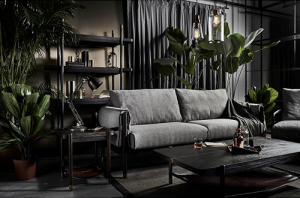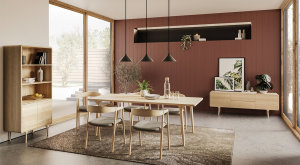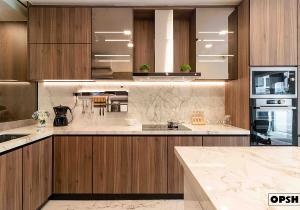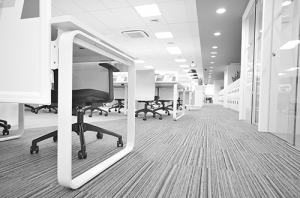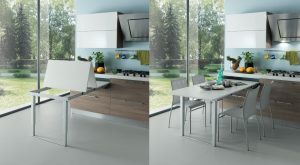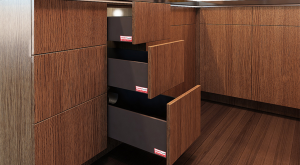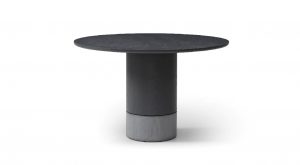From Makers to Creators
Growing up in a family of carpentry and with furniture-making factories as his playground since a kid, Joshua Koh—CEO of Commune, and 3rd generation of established furniture manufacturing firm Koda—is finding a new voice for his family business through design, and creating an empire of lifestyle products with a 21st century sensibility.
Kelley: Koda was founded by your grandfather in 1972 as a small setup, can you share with us the story of your grandfather and the early days of Koda?
Joshua: My grandfather used to teach carpentry to prisoners in the early days before he founded Koda. He started out making speaker boxes, TV boxes – which are made from plywood then, and jewellery boxes. His customers in the early days included retailers like Courts. He then looked into expanding the business to make furniture for the export market and our largest customers were UK brands that started sourcing in Asia. Koda started out with a factory in Punggol—which was swamp land at that time—and then shifted to Defu Lane where our corporate office is currently based. Production ceased in Singapore more than 20 years ago as we started to move our production bases to Malaysia, China and Vietnam due to increasing labour costs in Singapore.
Kelley: Commune is a brand created under the parent company Koda. Can you tell us how/why did Commune come about?
Joshua: Commune came about due to a design thinking exercise that the group embarked on in 2010. At that time, KODA was only conducting OEM/ODM manufacturing for other brands across the world and we were looking at ways to diversify our business, away from manufacturing which was facing very strong competition, having high cost pressures/low margins and diminishing customer loyalty due to the nature of the business. We realised that there was a lack of products and brands available in the mid-level segment of the market—both the low and high end are very well served—and as such we wanted to create a brand/concept that covers this mid-level segment by providing high quality designs and products at reasonable prices. The growing middle class—especially in Asia—made us realise that there would be a large unmet demand in this segment, which led us to develop our brand, Commune, to meet the needs of this growing customer base.

Joshua Koh, CEO, Commune. Photo courtesy of COMMUNE.
Kelley: How do you guys synergise the strengths of Koda and Commune?
Joshua: Koda has always been strong in R&D. We have always been ahead of the competition in spotting trends and our strength has been the innovative use of materials and manufacturing processes to make these products in an affordable way. Commune is able to tap into KODA’s DNA and take it a step further as we look at how we can design our collections according to themes that our customers can relate to. With the manufacturing knowhow that KODA possesses, together with Commune’s forward-thinking design process, we are able to make our dreams come alive.

Kelley: How would you describe the brand essence of Commune?
Joshua: Defy the norm – innovation and design is our DNA. We want to redefine the norms of the everyday, creating thematic environments suited to each individual’s persona. We strive to offer our customers good quality, lasting, environmental-friendly original designs at accessible prices. Engaging the 6 senses – creating a concept that invigorates our 6 senses, providing consumers with the knowledge and understanding of how various elements can affect the subconscious mind for them to feel physical comfort or simply enjoy an aesthetic suited to their lifestyle. Hence before designing a space or a product, our key is to do extensive research in our consumers’ living needs, wants and behaviour, so that we can give them the utmost experience without compromising practicality and style.
Kelley: How would you describe the design direction of Commune?
Joshua: Bringing people together – the essence in our designs is to create products and environments that facilitate bringing people together. Our vision is to come together to redefine everyday norms while celebrating human connections, diversity and originality.
Kelley: Who is your target audience?
Joshua: When we started Commune, we mapped out that our target audience would be PMETs between the ages of 28-45 who are looking into brands that match their lifestyle. However, as time went by, we realised that our brand was able to appeal to a much wider audience, even those in their 60s were buying from us; and we put it down to our designs that are generally timeless in nature and hence they appeal to a wide range of demographic types.
Kelley: Can you share some of the broad business strategies of your company?
Joshua: We believe that our brand not only relies on our well-designed products but also the experience that our customers have while they shopped at our stores. We designed our stores with our “6th senses design methodology” – engaging our customers’ 5 senses so that their 6th sense of emotion can be activated, and we believe that this leaves a much deeper impression of our brand in the customers’ minds and hearts. Our stores have signature scents and music that align with the brand persona, we encourage customers to make themselves at home, they are free to touch and feel our products as we serve them coffee/tea to engage their sense of taste.
Our strategy is to expand to countries whereby there is a large and growing middle class which can appreciate and afford our products, although our products are intrinsically designed to be good value for money. Hence our decision to focus on China whereby we see a very large potential, especially when the Chinese consumers do perceive value on imported brands/products. Other markets where we have concept stores include Malaysia, Philippines and Hong Kong, with Indonesia and India in the pipeline.
We have also understood that today’s customers embrace technology and this has brought us to focus on how we could use technology to make our customers’ shopping experience enjoyable and minimise the friction to purchase from us. We introduced a 3D floorplanner and VR solution in 2016 to allow better visualisation of our customers’ homes whilst they were shopping in our stores and more recently launched our Commune in-motion platform, which gave customers a true omni-channel experience. Part of this platform included a mobile APP with AR capabilities to allow customers to see our products in their existing environment.
Kelley: Commune works with government agency Enterprise Singapore towards a regional expansion, how is this progressing so far? Any plans to expand into to Europe/US?
Joshua: We have since expanded our presence outside of Singapore into the Asian region with concept stores in Malaysia, Philippines, Hong Kong, Macau and China. Our products are also being sold in multi-brand stores in Brunei, Vietnam, Russia and Senegal. We launched our brand in Europe via M&O (Maison & Objet) in January this year (2020) but due to COVID, our European market expansion has been slowed down.
Kelley: Last I read you already have close to 40 franchisees in China. Can you share with us your experience in the China market?
Joshua: We currently have over 70 Commune/Alt.o shops in China and we are looking to expand this even more in the coming years. China is currently our biggest market and constitutes the highest percentage of our revenues. We have done well so far mainly because there is a strong demand for imported brands from the Chinese market and having our roots in Singapore has helped to drive
demand for our products, as the Chinese recognise Singapore for our trustworthiness and high levels of quality. That said, competition is very fierce in China with many large brands fighting to gain market share. We also had to deal with the problem of imitations in China, which is quite prevalent.
Kelley: It is often said that creating a brand is the easy part, marketing it is the hard part. Can you share the marketing strategies of Commune in Singapore, and how do you adapt these plans in other countries? Or is marketing abroad a different story altogether?
Joshua: In Singapore, we have focused on social/digital media as our primary form of marketing. We try to create engaging content that our consumers can enjoy and learn from, such as how to style your home with accessories, what colors work well together, etc. We also conducted events in our store like “breakfast with strangers” which involved inviting strangers for breakfast with the aim of building new relationships, which is one of our brand values and what our brand name means. We have used the same strategies in our overseas markets but the marketing channels needed to be tweaked, as China does not allow Facebook and Instagram, so we have to adapt to WeChat and other platforms.
Kelley: Which is the next market that you see a potential in such a rapid expansion?
Joshua: Given the current outlook after the COVID-19 outbreak, we feel that China would be the only feasible market in the short to medium term for rapid expansion. Before the outbreak, we had plans for India and Indonesia as potential growth markets due to their large populations, high GDP growth rates as well as rapidly growing middle class.
Kelley: Do you think there is such a thing as a Singapore identity? Does Commune’s designs propagate a Singapore identity?
Joshua: I feel that Singapore as a brand is very well known as one that is cutting-edge and trustworthy. We have been put on the world stage by having the best airline, airport, port, and having major events like F1 being held here. We are also a highly modernised and urbanised city and this has translated into the way we live and we believe that Commune’s designs reflect how Singapore has identified itself as an urban oasis.
Kelley: Is it hard for a Singapore brand to make a name on the global platform? How is your experience in that?
Joshua: It has been hard especially since Singapore is not known for its consumer brands and products; to the outside world, we are known more for our financial sector and as a tourist destination. As such, consumers in foreign markets can sometimes find it hard to identify with a new brand like ours entering their market; as compared to an Italian brand, who would probably not have any issues.
However, because of Singapore’s high brand value—as a country—due to the accomplishments Singapore has achieved, mentioned earlier of us having best-of many things, we have gotten responses that were very positive and that had helped us to move many conversations forward.
Kelley: What are the unforgettable challenges/lessons you have faced in your journey of Commune so far?
Joshua: Building a brand from scratch is a long and tiring journey but one with very positive outcomes if done right. At every stage of our growth, we had to deal with different problems, from choosing the right products to launch, to catering to the various specifications required by consumers in different markets, bringing in the right people to help professionalise our business operations, etc. One of the key lessons I have learnt is that because things are changing so rapidly, it is important to be flexible and learn to adapt and pivot if things do not turn out the way we intended them to be. However, we also have to accept that sometimes it takes time before some ideas mature, so it is important to also hold onto our ideas even if they don’t seem to work in the short run.
Kelley: And on the other end, what are the highlights so far?
Joshua: The highlight is really seeing our brand and products being used in countries outside of Singapore, with people enjoying our designs as they build relationships with the friends and families around our sofa/dining sets. We are also very encouraged when we learnt that a lot of our customers have become fans of our brand and act as willing advocates, sharing their experience with their friends and family. We have always dreamed of our brand being an internationally recognised one, like IKEA, and we are continuously striving to make this happen.
Kelley: Which are some of the best selling pieces/items for Commune?
Joshua: Our best selling item in Commune has been our Geormani sofa and even though it has been in our collection for almost 9 years, we are still seeing very good sales of this sofa. Another more recent addition which has been a success would be our Volta collection, which consists of living room pieces like TV consoles and coffee tables. The unique designs are inspired by a music theme and our attention to detailing has made this collection an icon for our brand.

Kelley: I see a lot of wood in Commune’s designs. Has Commune experimented with any new/unusual materials/technology in its designs?
Joshua: We have been using wood in many of our designs as we believe that wood is able to soften the home environment. However, we have started to move towards using new materials like Terrazzo, as seen in our Tierra collection, and are looking into metal and quartz for some of our new collections.
Kelley: What is your take on sustainability in design? Does Commune embody these beliefs?
Joshua: We believe that sustainability is not just about using things like recycled materials or using timber from sustainable sources—which we do at Commune in any case—but also in ensuring that we make products that can last a long time, both in terms of quality and being aesthetically timeless. If people do not need to replace their furniture all the time, this will lead to less wastage and result in a more sustainable future.
Kelley: Do you promote/sell at International Furniture Fairs? Do you think these fairs are still relevant in the digital age where everything can be transacted over the internet?
Joshua: We recently participated in M&O (Maison & Objet) in January 2020 and ShenZhen Creative Week in August. We usually also participate in FurnitureChina in Shanghai in Sept. For the furniture industry, trade fairs are still an important means to showcase our products as buyers need to be able to touch and feel our products to be able to get a sense of the quality of the products. As it is very costly to ship furniture samples to potential customers due to the large size and weight of the products, trade fairs are still a cost effective way to reach a large number of potential customers.
Kelley: Commune has an e-commerce platform, how is that doing?
Joshua: We launched our Commune in-motion platform in September 2019 and this has been a success so far. Although there are not many transactions that has taken place on the platform, probably because our prices are not low enough for consumers to make a purchase decision without being able to touch and feel the product, it has been an integral part of the customers shopping journey as customers do most of their research and shortlisting online before they head down to shops to make a purchase decision. Having a good online experience is thus very important as first impressions are made online.
Kelley: The recent pandemic has disrupted almost all businesses. How did it affect Commune and did it propel you to rethink your business, or business strategies?
Joshua: Our business was affected during the circuit breaker lockdowns but because we had the digital infrastructure in place, we were able to activate our sales staff to act as tele-sales agents and guide customers through their purchase decisions whilst they shopped online. The pandemic has made us realise that our existing website did not have enough product information for our customers, such as detailed dimensions and specifications, which led us to work on a revamped site that incorporated these information for a better online experience. We had also launched our Malaysia and Philippines e-commerce platforms during the past few months as these countries were on lockdowns which resulted in our stores being closed, and people were unable to go down to our shops.
Kelley: What are your ambitions for Commune?
Joshua: My ambition is for Commune to become a name that is internationally recognised and one that comes to mind when people think of furniture, as currently only IKEA managed to achieve that. We also have ambitions to branch out of just furniture but into other lifestyle businesses, such as hotels, F&B, etc., to further drive the lifestyle aspect of our brand.
Kelley: Any last words for aspiring young furniture designers/entrepreneurs?
Joshua: To dream big and not to be afraid of failure. It’s more important to learn from our failures and make the necessary changes to make our ideas a success.
15 November 2020


